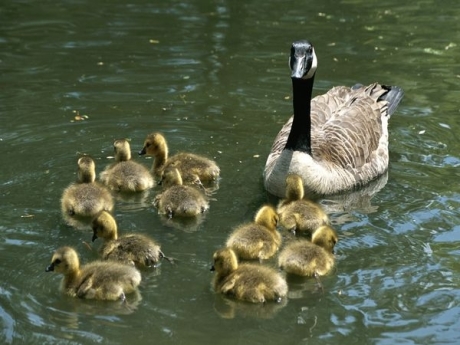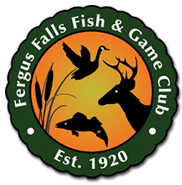Giant Canada Goose Project
Members of the Fergus Falls Fish & Game Club were alarmed at the decline of waterfowl and hunting in the early 1960's. After giving the matter some study, our club decided to expend a major portion of our efforts towards improving the situation which included a Canada Goose restoration project. The project's main purpose was to restore a breeding population of Giant Canada Geese to the abundant waterfowl habitat in the Fergus Falls area which has been unoccupied by geese since the early days.
The project was started in 1963 with the acquisition of about $1,200 worth of the best breeding stock available. It was financed with regular club funds and with special donations from various clubs and individuals. Construction of two large woven wire pens of about 3-4 acres contained the 20 individual breeding pair. Cooperation from the Fergus Falls City Park Department consisted of furnishing the land and an agreement to pay half the cost of the goose feed as well as to care for the geese through the winter.
The project was started in 1963 with the acquisition of about $1,200 worth of the best breeding stock available. It was financed with regular club funds and with special donations from various clubs and individuals. Construction of two large woven wire pens of about 3-4 acres contained the 20 individual breeding pair. Cooperation from the Fergus Falls City Park Department consisted of furnishing the land and an agreement to pay half the cost of the goose feed as well as to care for the geese through the winter.

The plan was to give the flightless penned parent stock intensive care during the reproductive season and to allow all annual production to fly free with the hope that these geese will then nest on the habitat in the surrounding countryside. Early results gave every indication that the objective of establishing a self-perpetuating Canada Goose on our wetland habitat would be realized.
Production from the initial flock was good, increasing from 5 in 1964 to 43 in 1965, to 86 in 1966 and to over 100 in subsequent years, reaching about 150 in 1969. Most significant was the fact that geese were nesting on wetland habitat in all directions from town. In 1969, locations of 14 broods ranging from one to ten or more miles from the city were known.
Important progress was made for the goose project in 1969. When the geese began to fly out from the city and to nest in the country, it soon became apparent that some additional protection from hunting was needed if a sufficient number of these semi-tame birds were to survive to sustain the flock and allow the geese to become more wary in succeeding generations. Therefore, a request was made to the Division of Game and Fish for a protected zone in which the geese could not be hunted. The Division replied that such protection could only be furnished after the passage of new legislation. This legislation would permit the Department to set up refuges for a single species of game. Accordingly, the club supported the "Single Species Refuge Bill" by working with local legislators. The bill was passed and the Southwest Otter Tail County Goose Refuge was established prior to the hunting season of 1969.
In the 1980's, the population of Greater Canada Geese had become established and grown to the point that a refuge encircling Fergus Falls was no longer deemed necessary. Today, the Otter Tail River in Fergus Falls and the Orwell Refuge southwest of town are a major stopover for geese during the fall migration. In addition, some would say that the Greater Canada Goose has become a "saving grace" for waterfowlers during the fall hunting season as our duck numbers have diminished.
Production from the initial flock was good, increasing from 5 in 1964 to 43 in 1965, to 86 in 1966 and to over 100 in subsequent years, reaching about 150 in 1969. Most significant was the fact that geese were nesting on wetland habitat in all directions from town. In 1969, locations of 14 broods ranging from one to ten or more miles from the city were known.
Important progress was made for the goose project in 1969. When the geese began to fly out from the city and to nest in the country, it soon became apparent that some additional protection from hunting was needed if a sufficient number of these semi-tame birds were to survive to sustain the flock and allow the geese to become more wary in succeeding generations. Therefore, a request was made to the Division of Game and Fish for a protected zone in which the geese could not be hunted. The Division replied that such protection could only be furnished after the passage of new legislation. This legislation would permit the Department to set up refuges for a single species of game. Accordingly, the club supported the "Single Species Refuge Bill" by working with local legislators. The bill was passed and the Southwest Otter Tail County Goose Refuge was established prior to the hunting season of 1969.
In the 1980's, the population of Greater Canada Geese had become established and grown to the point that a refuge encircling Fergus Falls was no longer deemed necessary. Today, the Otter Tail River in Fergus Falls and the Orwell Refuge southwest of town are a major stopover for geese during the fall migration. In addition, some would say that the Greater Canada Goose has become a "saving grace" for waterfowlers during the fall hunting season as our duck numbers have diminished.
